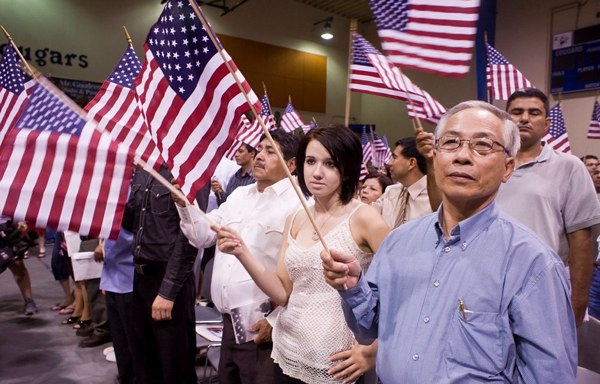
In my small sampling of friends and relatives, which includes my parents and a close friend who is South Asian American, all of whom were immigrants to the United States, it seems obtaining U.S. citizenship hasn’t been a top priority in their lives. For my parents who came on a green card from Taiwan, they didn’t choose to get their U.S. citizenship until almost 20 years passed after they came to the U.S., a full 13-plus years after they were legally entitled to apply for citizenship. Likewise my friend and mentor, for most of the 20-plus years he was in the U.S. on a green card, he also chose not to seek out U.S. citizenship.
That’s why it wasn’t that much of a surprise for me to see news about citizenship drives targeted at Asian Americans being advertised for both coasts of the United States.
According to U.S. Citizenship and Immigration Services (USCIS), there’s almost 8 million eligible green card holders who haven’t chosen to become U.S. citizens yet.
The reasons behind the reluctance to become U.S. citizens vary, but a number of them may be a result of misinformation. My own parents thought that if they became citizens, they would have to deal with what they perceived as the hassle of voting and dealing with jury duty. But those reasons hid the underlying truth. My dad told me later in life, that he never got around to becoming a U.S. citizen until we were teenagers because he never thought he was going to stay in the United States. He came to the U.S. to get his graduate degree, and he always thought as a family we were going back to Taiwan. Then one day he woke up, and realized all his kids were almost adults, more American than Chinese, and there was no going back.
My South Asian American friend told me a similar story. He held on to his Indian citizenship thinking there was always the possibility of going home. But once his kids got to a certain age, and he realized how American his children had become, he realized there was no going back, and gave in and applied for U.S. citizenship. The other driving factor for him was September 11, 2001. He thought it would be safer to be a citizen in the U.S. in case any anti-immigrant sentiment caused problems for green card holders.
So for my parents, and for my friend, when the kids end up being more American than you ever expect, that’s when you realize you’ve made the U.S. your home, and you pledge your allegiance to a new country. After becoming citizens, both my parents and my friend, wished they had done it sooner.
From a Yahoo article on the same topic:
‘There are many reasons why people don’t become citizens, some people don’t know the benefits and feel that if they already have a residence card they can work, they can travel, then they feel they don’t need citizenship,’ said Gitomer.
‘But citizenship gives them the benefit of voting, obtaining a US passport to travel without restrictions, obtain better jobs,’ she said, citing studies that show that people who become citizens began to earn more money.
So if you’re still holding on to your green card and you’re eligible to become a U.S. citizenship, maybe it’s time to look at your reasons for not becoming a citizen, and figure out if those reasons are still valid, before you wake up one day, and realize, there’s no going back.







